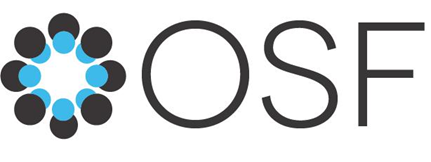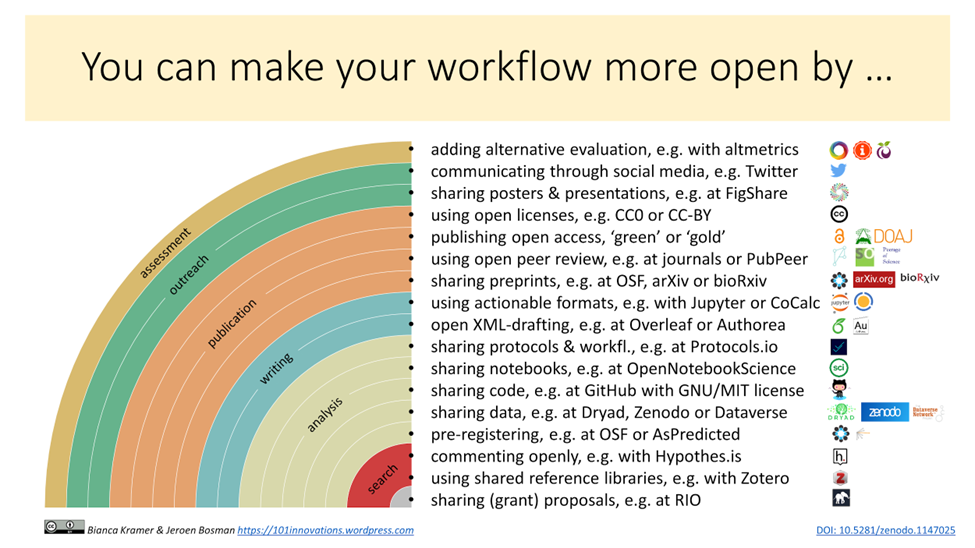
Open Science Framework (OSF) is a fully open access tool, for use in any discipline, which can be applied to virtually all stages of the research lifecycle from the planning and design phase all the way through to publication, access and reuse.
Before diving into OSF, let’s back up a bit and talk about open science which refers to a set of principles and practices aimed at making scientific research and data accessible, transparent, reproducible and collaborative. Open science practices have become a prominent topic in the scientific research community. Open scholarship is increasingly recognized as a general best practice and also becoming a global requirement, shown through mandates such as the White House Office of Science and Technology Policy (OSTP)’s 2022 Nelson Memo. Librarians in STEM, or those who support research in general, are finding themselves needing to provide support with open research practice. Librarians themselves are using open tools to facilitate their own research and publication. Two previous Inside Science Resources blog posts have directly discussed the topic of open science; What is Open Science Anyways?, and Teaching Open Science/Scholarship Practices; while there are quite a few others that discuss concepts, tools and practices tied to open science. Tools to facilitate the open workflow are necessary and there are quite a few of them out there.

When talking about open science tools, we can be talking about quite a lot. At any stage of the research lifecycle there are tools that can make that stage of the process more open. Many tools such as LaTex, GitHub and Zotero are well established and widely used whether explicitly to make the workflow open or not. Others, such as DataCite and ORCiD, have been developed specifically as tools for open research. OSF is an open research specific tool which has the capacity to be used at almost every stage of the open workflow.
OSF is a versatile tool with many applications. It is developed and maintained by the Center for Open Science (COS) whose mission is to research and promote open scholarship practices. It can serve as a project management and collaboration tool allowing research teams to work on a project privately or make some or all of the project publicly accessible. It can also be used as a workflow system, and to that end, integrates with many of the tools researchers are already using. Some of OSF’s key features include:
Sign-In: Public OSF content can be accessed without an account, however, to create or collaborate on projects an account is needed. There are three ways to create an account and multiple sign-in methods can be integrated into one account. If the user is affiliated with an institution that is a member of OSF, they have the option of using their institution’s single sign-on. Institutional affiliations can then be automatically associated with the user’s projects. Other options include using an ORCiD iD or an email address. Note that these options make it possible to collaborate with pretty much anyone; researchers from other institutions, people from industry, even those in the general public who might be involved in something like a citizen science capacity.
Pre-registration: OSF provides the infrastructure to preregister research. Registering a project helps to promote transparency and integrity in scientific research. Pre-registration is an important part of Open Science that helps keep research honest. Problematic practices such as low statistical power, selective reporting of results and publication bias are mitigated by preregistration while the opportunity to report unexpected findings remains open. Even if a study is abandoned or the results are never published, the registration remains as a record of the work up until that point.
Project Dashboard: The project dashboard allows multiple elements of a project to be handled in one central location. It also provides controlled access so that part or all of a project can become publicly accessible or remain private. The project dashboard includes researcher affiliations, license information, a wiki, project components and file storage as well as a pre-print linking option. It allows for version control and public projects can be assigned DOIs. OSF offers integrations with other tools which can also appear on the dashboard including citation management apps Zotero and Mendeley and storage add-ons like Google Drive, Box and GitHub.
Repository: One common use of OSF is as a cross-disciplinary repository for data and other research artifacts. Metadata can be added to files for increased discoverability. It is also a place to share “grey data” or work that doesn’t make it into official publication. Grey data can include things like analytical code, detailed protocols, study procedures, and survey instruments. This information usually does not make it into official publication but is often necessary for reproducibility. OSF does have limitations that do not make it an ideal repository for all use cases. For example, there is a 50GB public and 5 GB private file storage limit and it is not HIPAA compliant. However, for those needing a catch-all location for artifacts without a better home, OSF can be a good option.
Finally, I want to touch on a few notable use cases in both the classroom and library land:
- OSF can be used as a teaching tool. One professor on my campus uses it to give undergraduate students hands-on experience with open science research as an embedded part of their course. It can also be used as a place to publish class papers as seen in this example: UMD Clark Engineering WIE Science and Technology Policy Papers.
- As librarians we do our own research, and searching “librarian” on OSF will return thousands of results from project components, to data files to pre-registrations. It is a common place for those working on systematic reviews to place their search protocols (here’s an example). It can also be a great professional organization’s no-cost repository; the Engineering Library Division(ELD), part of the American Society for Engineering Education (ASEE), uses it as a repository for the slides and posters from the ASEE annual conferences.
OSF is a powerful, free open scholarship tool which can be useful to librarians and the patrons we serve.
Sarah Weiss, STEM and Open Science Librarian at the University of Maryland, College Park
We welcome your comments and suggestions. If you have a resource that you would like to see highlighted please leave us a comment.

